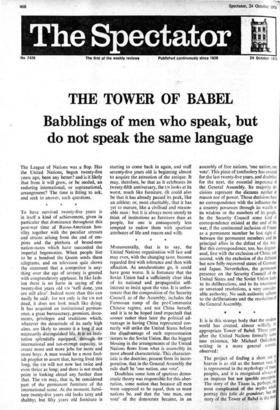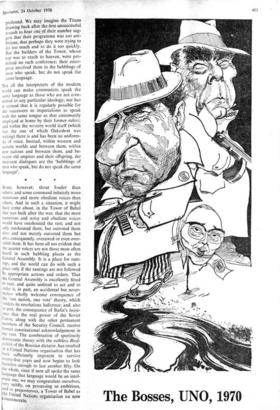THE TOWER OF BABEL Babblings of men who speak, but
do not speak the same language
The League of Nations was a flop. Has the United Nations, begun twenty-five years ago, been any better? and is it likely that from it will grow, or be seeded, an enduring international, or supranational, arrangement? The time is fitting to ask, and seek to answer, such questions.
To have survived twenty-five years is in itself a kind of achievement, given in particular that dominance throughout this post-war time of Russo-American hos- tility together with the peculiar stresses and strains arising from the end of em- pires and the plethora of brand-new nation-states which have succeeded the imperial hegemonies. When people live to be a hundred the Queen sends them telegrams, and on television quiz shows the statement that a competitor is any- thing over the age of seventy is greeted with congratulatory applause. In like fash- ion there is no harm in saying of the twenty-five years old UN 'well done, you are still alive'. Indeed more than this can easily be said : for not only is the urt not dead, it does not look much like dying. It has acquired an institutional perman- ence, a great bureaucracy, premises, docu- ments, privileges and traditions which, whatever the desuetude of its early high aims, are likely to ensure it a long if not necessarily distinguished life. It is an insti- tution splendidly equipped, through -its international and tax-exempt capacity, to create more and more jobs for more and more boys. A man would be a most fool- ish prophet to assert that, having lived this long, the UN will not now last twice and even thrice as long; and there is not much point in looking ahead any further than that. The uN may, that is, be considered part of the permanent furniture of the international scene. At the moment, furni- ture twenty-five years old looks tatty and shabby; but fifty years old furniture is starting to come back in again, and stuff seventy-five years old is beginning almost to acquire the attraction of the antique. It may, therefore, be that as it celebrates its twenty-fifth anniversary, the UN looks at its worst, much like furniture. (It could also be that it has already passed its peak, like an athlete; or, most charitably, that it has yet to mature, like a civilised and reason- able man : but it is always more seemly to think of institutions as furniture than as people, for one is consequently less tempted to endow them with spurious attributes of life and reason and will).
Monumentally, that is to say, the United Nations organisation will last and may even, with the changing taste, become regarded first with tolerance and then with affection. As anochronisms go, it could have gone worse. It is fortunate that the Soviet Union had a sufficiently clear idea of its national and propagandist self- interest to insist upon the veto. It is unfor- tunate that the composition of the Security Council, as of the Assembly, includes the Formosan rump of the pre-Communist Chinese regime, and not China herself; and it is to be hoped (and expected) that sooner rather than later the political ad- vantage in having China represented cor- rectly will strike the United States before the disadvantage of such representation oecurs to the Soviet Union. But the biggest blessing in the arrangements of the United Nations flows from what is ostensibly its most absurd characteristic. This character- istic is the doctrine, present from its incor- poration, that in the General Assembly the rule shall be 'one nation, one vote'.
Doubtless some item of spurious demo- cratic theory was responsible for this aber- ration, some notion that because all men were supposed to be equal, then so must nations be, and that the 'one man, one vote' of the democrats became, in an assembly of free nations, 'one nation, one vote'. This piece of tomfoolery has ensured for the last twenty-five years, and doubtless for the next, the essential impotence of the General Assembly. Its majority de- cisions represent the dictates neither of reason nor of power. Those decisions have no correspondence with the influence that a country possesses through its wealth or its wisdom or the numbers of its people In the Security Council some kind of correspondence existed at the end of the war, if the sentimental inclusion of France as a permanent member be lost sight of, between the permanent members and the principal allies in the defeat, of the Axis. But this correspondence, too, has degener- ated, first with the exclusion of China; and second, with the exclusion of the defeated but now fully recovered states of Germany and Japan. Nevertheless, the permanent presence on the Security Council of the United States and the Soviet Union lends to its deliberations, and to its unanimous or unvetoed resolutions, a very consider able authority. No such authority adheres to the deliberations and the resolutions of the General Assembly.
a
It is in this strange body that the modem world has created, almost wilfully, iu appropriate Tower of Babel. Three years after the United Nations formally came into existence, Mr Michael Oakeshott, writing in a more general context. observed : The project of finding a short cut to heaven is as old as the human race. is represented in the mythology of moll peoples, and it is recognised always as an impious but not ignoble enterpno The story of the Titans is, perhaps, the most complicated of the myths vol°, portray this folie de grandeur; but ttr story of the Tower of Babel is the Oa profound. We may imagine the Titans drawing back after the first unsuccessful assault to hear one of their number sug, gest that their programme was too am- bitious, that perhaps they were trying to do too much and to do it too quickly. But the builders of the Tower, whose top was to reach to heaven, were per- mitted no such conference; their enter- prise involved them in the babblings of men who speak, but do not speak the same language.
Not all the interpreters of the modern world can make communists speak the same language as those who are not com- mitted to any particular ideology; nor has it seemed that it is regularly possible for the successors to imperialisms to speak with the same tongue as that customarily employed at home by their former rulers; and within the western world itself (which was the one of which Oakeshott was writing) there is and has been no uniform- ity of voice. Instead, within western and eastern worlds and between them, within new nations and between them, and be- tween old empires and their offspring, the incessant dialogues are the `babblings of men who speak, but do not speak the same language'.
Some, however, shout louder than others; and some command infinitely more numerous and more obedient voices than others. And in such a situation, it might have come about, in the Tower of Babel that was built after the war, that the most numerous and noisy and obedient voices would have outshouted the rest; and not only outshouted them, but outvoted them also; and not merely outvoted them but also, consequently, overawed or even over- ruled them. It has been all too evident that the quieter voices are not those most often heard in such babbling places as the General Assembly. It is a place for rant- ings, and the world can do with such a place only if the rantings are not followed by appropriate actions and orders. That the General Assembly is excellently fitted to rant, and quite unfitted to act and to order is, in part, an accidental but never- theless wholly welcome consequence of the 'one nation, one vote' theory, which renders its resolutions ludicrous; and, also in part, the consequence of Stalin's insist- ence that the real power of the Soviet Union, along with the other permanent members of the Security Council, receive formal constitutional acknowledgement in the veto. The combination of spuriously democratic theory with the ruthless Real- politik of the Russian dictator. has resulted in a United Nations organisation that has been sufficiently impotent to survive twenty-five years and now begins to look harmless enough to last another fifty. On the whole, since if men all spoke the same language that language would be an intol- erant one, we may congratulate ourselves, very mildly, and so on possessing so ambitious, preposterous, a Tower of Babel as the United Nations organisation we now Mmeinorate.
The Bosses, UNO, 1970















































 Previous page
Previous page